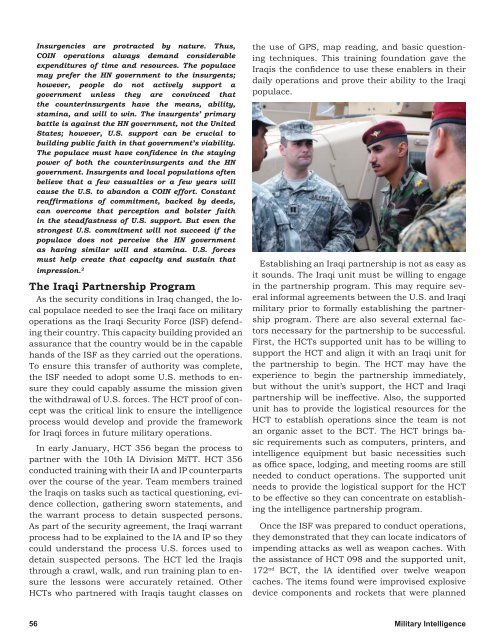George w. casey jr. - Federation of American Scientists
George w. casey jr. - Federation of American Scientists
George w. casey jr. - Federation of American Scientists
Create successful ePaper yourself
Turn your PDF publications into a flip-book with our unique Google optimized e-Paper software.
Insurgencies are protracted by nature. Thus,<br />
COIN operations always demand considerable<br />
expenditures <strong>of</strong> time and resources. The populace<br />
may prefer the HN government to the insurgents;<br />
however, people do not actively support a<br />
government unless they are convinced that<br />
the counterinsurgents have the means, ability,<br />
stamina, and will to win. The insurgents’ primary<br />
battle is against the HN government, not the United<br />
States; however, U.S. support can be crucial to<br />
building public faith in that government’s viability.<br />
The populace must have confidence in the staying<br />
power <strong>of</strong> both the counterinsurgents and the HN<br />
government. Insurgents and local populations <strong>of</strong>ten<br />
believe that a few casualties or a few years will<br />
cause the U.S. to abandon a COIN effort. Constant<br />
reaffirmations <strong>of</strong> commitment, backed by deeds,<br />
can overcome that perception and bolster faith<br />
in the steadfastness <strong>of</strong> U.S. support. But even the<br />
strongest U.S. commitment will not succeed if the<br />
populace does not perceive the HN government<br />
as having similar will and stamina. U.S. forces<br />
must help create that capacity and sustain that<br />
impression. 2<br />
The Iraqi Partnership Program<br />
As the security conditions in Iraq changed, the local<br />
populace needed to see the Iraqi face on military<br />
operations as the Iraqi Security Force (ISF) defending<br />
their country. This capacity building provided an<br />
assurance that the country would be in the capable<br />
hands <strong>of</strong> the ISF as they carried out the operations.<br />
To ensure this transfer <strong>of</strong> authority was complete,<br />
the ISF needed to adopt some U.S. methods to ensure<br />
they could capably assume the mission given<br />
the withdrawal <strong>of</strong> U.S. forces. The HCT pro<strong>of</strong> <strong>of</strong> concept<br />
was the critical link to ensure the intelligence<br />
process would develop and provide the framework<br />
for Iraqi forces in future military operations.<br />
In early January, HCT 356 began the process to<br />
partner with the 10th IA Division MiTT. HCT 356<br />
conducted training with their IA and IP counterparts<br />
over the course <strong>of</strong> the year. Team members trained<br />
the Iraqis on tasks such as tactical questioning, evidence<br />
collection, gathering sworn statements, and<br />
the warrant process to detain suspected persons.<br />
As part <strong>of</strong> the security agreement, the Iraqi warrant<br />
process had to be explained to the IA and IP so they<br />
could understand the process U.S. forces used to<br />
detain suspected persons. The HCT led the Iraqis<br />
through a crawl, walk, and run training plan to ensure<br />
the lessons were accurately retained. Other<br />
HCTs who partnered with Iraqis taught classes on<br />
the use <strong>of</strong> GPS, map reading, and basic questioning<br />
techniques. This training foundation gave the<br />
Iraqis the confidence to use these enablers in their<br />
daily operations and prove their ability to the Iraqi<br />
populace.<br />
Establishing an Iraqi partnership is not as easy as<br />
it sounds. The Iraqi unit must be willing to engage<br />
in the partnership program. This may require several<br />
informal agreements between the U.S. and Iraqi<br />
military prior to formally establishing the partnership<br />
program. There are also several external factors<br />
necessary for the partnership to be successful.<br />
First, the HCTs supported unit has to be willing to<br />
support the HCT and align it with an Iraqi unit for<br />
the partnership to begin. The HCT may have the<br />
experience to begin the partnership immediately,<br />
but without the unit’s support, the HCT and Iraqi<br />
partnership will be ineffective. Also, the supported<br />
unit has to provide the logistical resources for the<br />
HCT to establish operations since the team is not<br />
an organic asset to the BCT. The HCT brings basic<br />
requirements such as computers, printers, and<br />
intelligence equipment but basic necessities such<br />
as <strong>of</strong>fice space, lodging, and meeting rooms are still<br />
needed to conduct operations. The supported unit<br />
needs to provide the logistical support for the HCT<br />
to be effective so they can concentrate on establishing<br />
the intelligence partnership program.<br />
Once the ISF was prepared to conduct operations,<br />
they demonstrated that they can locate indicators <strong>of</strong><br />
impending attacks as well as weapon caches. With<br />
the assistance <strong>of</strong> HCT 098 and the supported unit,<br />
172 nd BCT, the IA identified over twelve weapon<br />
caches. The items found were improvised explosive<br />
device components and rockets that were planned<br />
56 Military Intelligence















